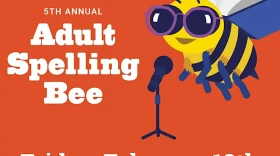April is National Poetry Month. For the past couple weeks, Lake Effect has featured work from local poets and talked to writers about what attracted them to the art of poetry. For essayist Richard Hedderman, that's an easy answer.
But what keeps him energized about poetry? Well, that's a bit more complicated.
Essay: Why I Write Poetry
T.S. Eliot famously observed in his great poem, “The Four Quartets,” that April is the cruelest month. Economists quote this line every year during the first two weeks of that month when referencing the climax of the great American tax period. And so I suppose it’s ironic, that April is also National Poetry Month, poetry, unlike the American tax code, being an endeavor without rules or penalties. One never gets penalized for writing bad poetry, thankfully.
Oddly, I’ve never encountered anyone who has parsed Eliot’s line in the context of poetry itself. To what was Eliot referring? I couldn’t tell you. I’ve never been curious enough to sit and figure it out and, let’s face it, Eliot was a drip.
The question of why I write poetry occasionally comes up during National Poetry Month, and I find the reason can be as difficult to decode as Eliot’s line. Like so many male poets before me (maybe even Eliot!), I started writing poetry as a schoolboy out of one great desire: to impress girls. I was convinced that girls liked poetry and were fascinated by boys who wrote it. Write poetry, I reasoned, and girls will flock to you like pigeons to a statue.
That’s perhaps not the most successful image, but the idea was that if I wrote poetry, girls would find me fascinating; I’d be the irresistible focus of their attentions. Sometimes this worked fabulously. Most of the time it didn’t, but that’s OK; I liked poetry anyway and stuck with it.
To begin with, I love poetry for its immediacy, its promise of infinite surprise, its threat of immanent combustion. And I like the compression, how in a poem the entire universe can be packed into a single line. I like how physical it is—it’s compact and powerful like the short, sharp jabs of the boxer. And yet it has an astonishing fluidity: a poem can swim like a trout, plunge like a cataract, heave and spill like an ocean wave. And I’m always fascinated by the sight of ink sinking into the brilliant white flesh of the page as I write it.
I find it distinctly alchemical, wresting the everyday, mundane ordinariness of life and casting it into astonishing new forms—something that is magical, lyrical, heroic, glorious and transformative. It’s without limit in subject or range; a poem can tackle anything. And it’s curative; poetry can calm, console, cauterize and heal.
And I’m also utterly taken with its persistent and enthralling contradictions: a poem can kill two birds with one stone or breathe life into the dead; it can bite like salt or soothe and bind like a skein of silk.
I don’t entirely know why I write poetry instead of another form, or doing something else like throwing pots or playing the oboe. It’s certainly not easy, and it’s not exactly what I’d call fun. Sometimes it is, but that doesn’t keep me writing. I guess it’s just a good fit. It’s a job that somehow I like doing.
In a letter to his brother, Theo, in September 1881, Vincent van Gogh wrote, “I no longer stand helpless before nature.” And that’s the way I feel when I write a poem: it mends the void between myself and the rest of the world, and there is no longer a divide between me and what surrounds me.
Once or twice I literally tried to give it up as one would a bad habit. The impulse to write can be annoying, intrusive and inconvenient, and writing well is hard. It has been said that writing good poetry is like mining lead with a butter knife, only it’s not as lucrative and nowhere near as much fun. (Actually, I said that.) But I couldn’t do it. I couldn’t give up the one thing that allowed me to be conversant with the world, and articulate what I felt about everything in it.
And I’ll tell you this: if tomorrow, every sheet of paper—every scrap—blew away in the wind, and all the computers blew up, I’d find a stick and get down on my hands and knees and scratch my poems in the dirt.
Poem: The Art of Writing
I rearrange the paint cans, moving
the rustier ones to the back of the shelf,
check the opera schedule on the radio,
call the exterminator, look up used book stores
in our dog-eared yellow pages. Then
study my fingernails awhile until
they glow with a cool, interplanetary light,
examining them as though an eclipse
might transpire across their slight
and imperfect moons. From there I move on
to the fingertips where the body
harbors its strange, translucent
labyrinths, then consider the hand itself
and imagine wandering, if I could, its 27 shining
ridges of bone, all to keep me from thinking
about what I really fear: the blank page,
how its emptiness is blinding like a terrible fever.
What I truly love is when it’s over,
when the afternoon light
is behind me, the light that illumined
my hand hauling the pen across the trackless
plains of the paper desert. It is only then
that I emerge into the dying evening
light, nothing much on my mind,
heart weightless as a dragonfly, head
like a colander, admiring the spike weed,
the thunderheads.
Poet and essayist Richard Hedderman’s writing is featured in current and recent issues of Kestrel, Rattle and The Kentucky Review. He lives in Wauwatosa.





